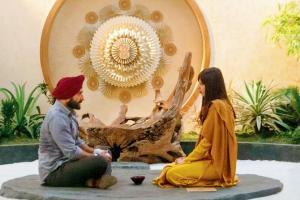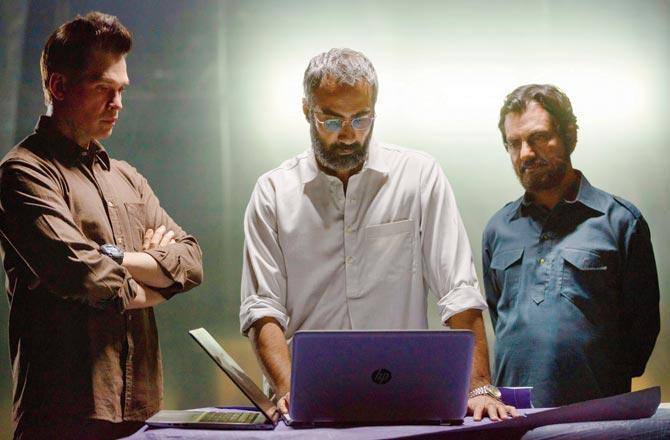The global popularity of Nawazuddin Siddiqui's Sacred Games character Ganesh Gaitonde made shooting the sequel easier for its makers

Saif Ali Khan shooting at the set of an ashram, created in a palatial studio, in the deep interiors of Malad
"I can give you the script [to read]," says director Anurag Kashyap, lounging after the day's gruelling shoot. He's of course not referring to the script of Sacred Games (SG) season two, the tightly guarded sets of which we are at, in Mumbai Film City's Reliance studio.
ADVERTISEMENT
"We're bound by such contracts that there'll come a time when I may have to look into it, even before saying hi," says Kashyap, revealing precious little about a dark 'warehouse sequence' he's just shot. But the script he's willing to privately share is still SG, although a different version that was offered to him to direct in 2013, by the American Scott Reid Productions.
Kashyap had flatly said no to it then, primarily because that script, sticking completely to Vikram Chandra's novel of the same name (unlike the Netflix version), was to be shot entirely in English. And he could never do that. The authenticity would've been completely lost.

Nawazuddin Siddiqui in a warehouse set in Film City
The fact that the 'universal is specific first' is a model that Netflix has followed to global success with subtitled super-hits like Narcos (Spanish), Fauda (Hebrew), and so many others. There is in fact an English-dub of SG available on the web-platform as well. Those who have seen it say it completely destroys the experience. Deeply rooted in the Mumbai milieu, characters in SG speak the city's language that, as writer Salman Rushdie once described it, is HUGME—Hindi, Urdu, Gujarati, Marathi, English.
Also Read: Sacred Games 2: Pankaj Tripathi's character inspired by controversial godman Rajneesh Osho?
Add to that Punjabi, since the lead, Cop Sartaj Singh, is Sikh, played by Bollywood star Saif Ali Khan, in blue turban, who we met earlier in the day in Malad—shooting an 'interior sequence' of an ashram, that he says "explores the 'sacred' part of Sacred Games, which wasn't so much there in the first season; but it comes in now."
Khan appears a much leaner Sartaj Singh (SS, on the set), from before. "The worn-out look, for someone less sedentary, mostly running around, is closer to how the character is described in the book. Also, with a clock ticking and all that, we're getting into more of an 'action series'," he says.
Khan's portions in the second season are being directed by Neeraj Ghaywan (Masaan), who took over from Vikramaditya Motwane from the first part, since Motwane was finding it hard to balance directorial duties with the job of the showrunner—who looks at the "macro-picture"; supervising for months, before and after production, with writers (led by Varun Grover), and editor (Aarti Bajaj); putting together 15-hour shoots, between multiple locations, time-lines, over 200 days, into seamless, eight episodes of a series. Phew!
Motwane doesn't normally visit the sets, he says. He doesn't need to since he implicitly trusts the two directors, Kashyap and Ghaywan, respectively filming parallel stories of Don Ganesh Gaitonde (Nawazuddin Siddiqui), and Sartaj, alongside. Both tracks, not just visually, even pace and performance-wise, play out, if you carefully observe SG season one, like two totally separate films.
Also Read: Nawazuddin Siddiqui on Sacred Games 2: Don't worry about role with Anurag around
Motwane agrees. And this isn't simply because the directors are different. So is the setting. "Gaitonde's world [a series of flashbacks], is a personality-led fable. Sartaj's is a more private space, of tension, and [building] mystery," he explains. From a technical/visual point of view, this is achieved through the use of different kinds of lenses—"anamorphic, with more saturation for Sartaj's [world]; and spherical, with less saturation, for Gaitonde's." While there is no "show-bible" as such, the template is more or less set.
Lay viewers are hardly going to notice these technicalities. What they will/have is, according to Khan, the reason he was instantly drawn to SG as the first Indian Netflix series going out to the world: "Besides an international sensibility in filmmaking, it [the subject] is very Indian. And by that I mean it's got mafia and cops, whose equations are unique. Then you've got religion, politics, God-men, and Bollywood, all thrown into the mix of what's a very psychological mind-game."
True. Can't wait! New season drops on August 15. Two-thirds of SG season one audience, Netflix reveals, has come in from outside India, making it truly a global show. Khan has been around as a Hindi film-star for over two and half decades, with 60-plus movies, and a strong audience-base among South Asians and other Bollywood fans abroad. One wonders if the demography eyeing/approaching him at international airports has broadened/changed a bit since SG. He gently shrugs, making little of that remark, "No... I don't know...
Maybe they expect a Sardar with a beard!"
Couple of days after SG dropped, Siddiqui, on the other hand, felt a bunch of locals weirdly staring at him on the streets of Rome while he was there for a film with actor Tanishtha Chatterjee: "Saamne gora dekh raha hai. Matlab, Sacred Games dekha hai," he whispered. The filmmakers shooting the second season seem to have equally benefitted from the prequel's success.
Kashyap recalls, "We've shot the sequel all over—Croatia, South Africa, Kenya… We shot on the same boat from Free Willy. There was an incredible riverside bungalow in Kenya. The moment the owner got to know Gaitonde was going to be there, he just let us do whatever we wanted."
Which brings us to, well: Where is Ganesh Gaitonde? In his village, as we speak. Or a village, aptly created as a set, in Goregaon! Stepping into the refreshment-tent outside the makeshift mud-hut, after a late-night shift, you can tell, Siddique has clearly shed Gaitonde behind, to reveal his usual, painfully shy self. Chameleon-like transformations have pretty much defined Siddiqui's career.
But the longest he's ever been with a character is obviously the Marathi gangster's: "It's become too internalised, I can't switch on-off like a computer." And he's evidently developed some empathy for him as well: "For one, he [Gaitonde] loves Mumbai. Two, he's very trusting.
And, he doesn't ever discriminate over religion."
For character-study, interestingly enough, Siddiqui points to his own brother as personal inspiration: "I have several [brothers], but only [a younger] one remained uneducated and stayed back in the village. People talk shit about him. I used to as well. It's only when I began to look deeper, I realised, he's essentially over-sensitive and over-reacts. If there's a galat baat (a wrong utterance), people might calm down. He can't. He became bad, because of the bad happening around him."
Extending that example, Siddique adds, "Take Dawood [Ibrahim]. People say he has a sharp mind. But it's twisted. If he'd applied his acumen in the right direction, he could've been a great businessman." Hmmm… Got it, Gaitonde.
Also Read: Sacred Games 2: Saif Ali Khan as Sartaj Singh poses a question in the promo
Catch up on all the latest entertainment news and gossip here. Also download the new mid-day Android and iOS apps to get latest updates
 Subscribe today by clicking the link and stay updated with the latest news!" Click here!
Subscribe today by clicking the link and stay updated with the latest news!" Click here!






